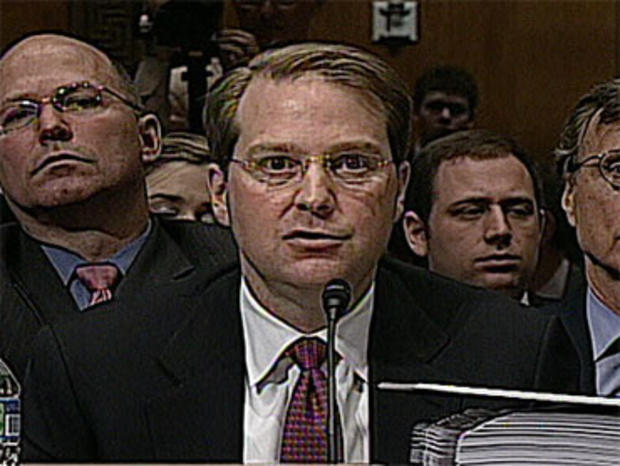Goldman Sachs on Capitol Hill: Testimony of Michael Swenson
Below is the prepared testimony that Michael Swenson, the managing director of the mortgage department at Goldman Sachs, delivered to the Permanent Subcommittee on Investigations Tuesday:
Good morning. Mr. Chairman, Ranking Member Coburn, Members of the Committee, my name is Michael Swenson. I am a Managing Director in the mortgage department at Goldman Sachs, where I have worked since 2000.
Let me begin by discussing my role with the firm in 2006 and 2007 and then give you a general chronology of the activities of the ABS desk through this period. I was a Managing Director in SPG Trading and co-managed the group. I was primarily responsible for the Asset-Backed Securities (ABS) trading desk, which was responsible for making markets in ABS securities and derivatives for our customer franchise. The ABS desk traded consumer ABS, sub-prime cash, singlename ABS credit default swaps (which I will refer to as "single names") and the ABX indices, which are a family of synthetic indices that reference a standard basket of 20 subprime deals.
Throughout 2006, numerous clients wanted to sell the ABX in order to express a negative view on the U.S. residential housing market. As a result of these trades, we took on long positions. In order to hedge those positions, we began to increase our short position in single-names. By November 2006, volatility in the ABX increased, pushing prices down. Because our positions in single names did not match identically the basket of securities that comprised the ABX, the positions moved at different rates and even different directions, resulting in losses for the ABS desk.
On December 14, 2006, David Viniar, the firm's CFO, called a meeting to go over the mortgage department's positions and risk. I attended a portion of that meeting, during which we discussed the ABS positions and the need to reduce the basis risk in the book. We were instructed to reduce risk and get the position "closer to home"; we were not told what direction to take - just to get there.
In the first quarter of 2007, we sold ABX, where possible, and increased our single name positions. However, the ABS desk continued to lose money because the market value of our long ABX positions was declining faster than our offsetting single names.
The relatively rapid decline in the index brought in a wave of short-covering and some new long interest. As a result, the ABS desk further reduced its long ABX position and purchased additional single-names. Because of a concern that the ABS desk was too short, it sold - or went long on - $2.8 billion in single-names, thus reducing our short position.
In the second quarter of 2007, the ABS desk covered several billion notional in single-names and purchased hundreds of millions of ABX long positions as the ABX index recovered These transactions reduced the desk's short position, in effect bringing the desk to a more balanced position.
Later in the quarter, the ABS desk increased its short position after it took on the CDO warehouse inventory from the CDO group. The inventory added several billion dollars in long RMBS exposure to the ABS desk at a time when the market was deteriorating. In order to manage this newly-assumed risk, the ABS desk increased our position in single names.
At the end of the third quarter, the ABS desk engaged in large block trades purchasing several billion notional of ABX risk while concurrently selling down a portion of our single-name positions - again, bringing the desk closer to home.
Throughout the period from late 2006 through much of 2007, the ABS desk executed its market making functions as principal, and our trades also reflected the views we had of the market.
The ABS desk did not only take short positions and, indeed, took many positions that ultimately reduced profits that the mortgage department otherwise might have realized. By reducing short positions, we left money on the table. But that is the nature of reducing risk while continuing to transact with clients as a market-maker.
Thank you for your consideration. I am happy to answer any questions members of the Subcommittee may have.
